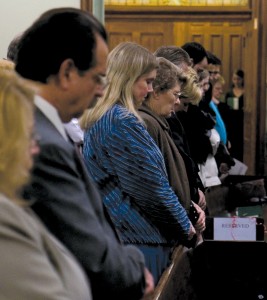
Pew Research Center’s Religious Center released a seven-year study on May 13 showing that Christianity has declined 8 percent and those who do not affiliate with a specific religion have increased 6 percent.
“The acceleration is a surprise,” said BYU religion professor Richard Holzapfel. “Everyone saw the declining trend in religious participation, but this is more dramatic than I was expecting.”
Chaplain Linda P. Walton, adviser of Utah Valley Interfaith and president of Utah Valley Ministerial Association, reacted to the Pew Study results with disappointment, particularly in the decline of the younger generation’s association with organized religion.
“I see this at UVU all the time. All of a sudden students get into college, and they are introduced to new ideas. They look at politics, at what they want to study, at who they want to marry, and they end up looking at their religion differently too,” she said.
Walton added that being devoutly religious can be difficult. She commented on the demands conservative religions like Catholicism or Mormonism have on their members and how youth don’t always have the desire to devote their time to those demands.
“It’s hard to read the Bible every day, and people aren’t as regimented as they were 25 years ago. Religion is still trying to accommodate to the 21st century,” Walton said.
The study shows only a 0.1 percent decrease for the LDS Church. However, the percentage of members age 18–29 has dropped by 3 percent.
Holzapfel and BYU church history professor J.B. Haws attribute some of this decline to living in the Information Age.
“I think the Internet is a big factor in fostering a skepticism of authority,” Haws said. “It’s changed people’s quest for truth and the way people connect with each other. There’s a greater global awareness.”
“It’s an age in which people are trying to be politically correct,” Holzapfel said. “People feel funny about saying that they’re a part of the true faith; they think it sounds arrogant.”
Another factor, Holzapfel added, is the dramatic change in Sunday worship over the last 20 years. While church attendance was much more traditional — and even expected — 20–30 years ago, today that is not the case.
“People wonder if they need to go to church in order to be spiritual,” Holzapfel said. “If we want to be part of a family, we need to have a community of activity. Those who no longer affiliate themselves with religious groups may not see the consequences. They lose something.”
With the increase of missionaries and the emphasis on missionary work in the LDS Church, it may seem surprising that there was no substantial difference. Church records say numbers are increasing, but the Pew study doesn’t reflect that. Tim Heaton, a BYU sociology professor who studies trends in Mormonism, said that a rise of people coming in also includes a rise of people leaving.
“People accept the missionaries and join, but then over time they don’t feel like they fit in,” Heaton said.
Overall, however, Heaton felt positively about the minimal change. “We’re not losing people, and a lot of people are. Given all the demands, it’s easier to have no affiliation these days. Even with the high expectations of the church, the fact that we haven’t significantly decreased in numbers is good.”




